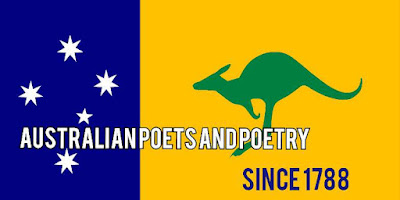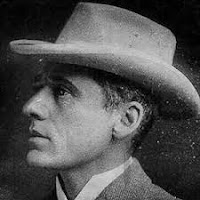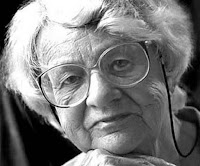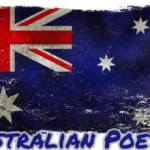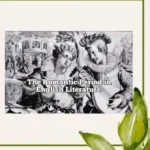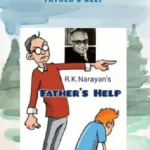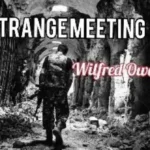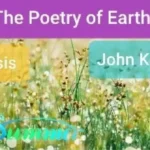Famous Australian Poets and Poems
Australian Poets and Poems
Australia was discovered in 1770 by Captain James Cook and since then it has grown and developed immensely as a nation.
Australian writers has, since 1778, introduced the character of a new continent into literature – exploring such themes as aboriginality, mateship, egalitarianism, democracy, national identity, migration, Australia’s unique location and geography, the complexities of urban living, and the “beauty and the terror” of life in the Australian bush.
Both Gordon’s and Brennan’s works conformed to traditional styles of poetry, with many classical allusions, and therefore fell within the domain of high culture. However, at the same time, Australia was blessed with a competing vibrant tradition of folk songs and ballads. Henry Lawson and Banjo Paterson were two chief exponents of these popular ballads and Banjo Paterson was responsible for creating what is most probably the most famous Australian verse, “Waltzing Matilda”.
The poets who reflected a sense of Australian identity include:
Famous Australian Poets
• A. B (Banjo) Paterson
• Shaw Neilson
• Kenneth Slessor
• A. D. Hope
• Judith Wright
• James Mcauley
• Vincent Buckley
• Francis Webb
• Bruce Beaver
• Peter Porter
• Chris Wallace Crabbe
• David Malouf
•Rodney Hall
• Australian Poets and their Poems:
1. A.B (Banjo) Paterson
Waltzing Matilda
Once a jolly swagman camped by a billabong
Under the shade of a coolibath tree;
And he sang, as he watched and waited while his billy boiled:
“Who’ll come a-waltzing Matilda with me?”
Chorus Waltzing Matilda, Waltzing Matilda,
Who’ll come a-waltzing Matilda with me?
And he sang as he watched and waited while his billy boiled:
“Who’ll come a-waltzing Matilda with me?”
Down came a jumbuck to drink at that billabong,
Up jumped the swagman and grabbed him with glee;
And he sang as he shoved that jumpbuck in his tucker-bag,
“You’ll come a-waltzing Matilda with me!”
Chorus Waltzing Matilda, Waltzing Matilda,
You’ll come a-waltzing Matilda with me
And he sang as he shoved that jumbuck in his tucker-bag:
“You’ll come a-waltzing Matilda with me!”
Up came the squatter, mounted on his thoroughbred,
Up came the troopers – one-two-three!
“Whose that jolly jumbuck you’ve got in your tucker-bag?
You’ll come a-waltzing Matilda with me!”
Chorus Waltzing Matilda, Waltzing Matilda,
You’ll come a-waltzing Matilda with me:
“Whose that jolly jumbuck you’ve got in your tucker-bag?
You’ll come a-waltzing Matilda with me!”
Up jumped the swagman and sprang into the billabong,
“You’ll never catch me alive!” said he
And his ghost may be heard as you pass by that billabong,
“You’ll come a-waltzing Matilda with me!”
Chorus Waltzing Matilda, Waltzing Matilda,
You’ll come a-waltzing Matilda with me!
And his ghost may be heard as you pass by that billabong,
“You’ll come a-waltzing Matilda with me!”
2. Shaw Neilson
To a Blue Flower
I would be dismal with all the pearls of the crown of a king:
But I can talk plainly to you, you little blue flower of the Spring!
Here in the heart of September the world that I walk in is full
Of the hot happy sound of the shearing, the rude heavy scent of the wool.
Soon would I tire of all riches or honours or power that they fling;
But you are my own, my own folk, you little blue flower of the Spring!
I was around by the cherries today; all the cherries are pale:
The world is a woman in velvet: The air is the colour of ale.
I would be dismal with all the fine pearls of the crown of a king;
But I can give love-talk to you, you little blue flower of the Spring!
Surely God was a Lover
Surely God was a lover when He bade the day begin
Soft as a woman’s eyelid – white as a woman’s skin.
Surely God was a lover, with a lover’s faults and fears,
When He made the sea as bitter as a wilful woman’s tears.
Surely God was a lover, with the madness love will bring:
He wrought while His love was singing, and put her soul in the Spring.
Surely God was a lover by a woman’s wile controlled,
When He made the summer a woman thirsty and unconsoled.
Surely God was a lover when he made the trees so fair;
In every leaf is a glory caught from a woman’s hair.
Surely God was a lover – see, in the flowers He grows,
His love’s eyes in the violet – her sweetness in the rose.
Stony Town
If ever I go to Stony Town I’ll go as to a fair,
With bells and men and a dance-girl with the heat-wave in her hair:
I’ll ask the birds that live on the road; for I dream (though it may not be)
That the eldest song was a forest thought and the singer was a tree.
Oh, Stony Town is a hard town! It buys and sells and buys:
It will not pity the lights of youth or any love in the eyes:
No curve they follow in Stony Town, but the straight line and the square:
-And the girl shall dance them a royal dance, like a blue wren at his prayer.
Oh, Stony Town is a hard town! it sells and buys and sells:
-Merry men three I will take with me, and seven and twenty bells:
The bells will laugh and the men will laugh, and the girl shall shine so fair
With the scent of love and cinnamon dust shaken out of her hair.
Her skirts shall be of the gossamer, full thirty inches high;
And her lips shall move as the flowers move to see the winds go by:
The men will laugh, and bells will laugh to find the world so young;
And the girl shall go as a velvet bird, with a quick-step on her tongue.
She shall cry aloud that a million moons for a lover is not long,
And her mouth shall be as the green honey in the honey-eater’s song:
If ever I go to Stony Town, I’ll go as to a fair,
And the girl shall shake with the cinnamon and the heat-wave in her hair.
The Bard and the Lizard
The lizard leans in to October,
He walks on the yellow and green,
The world is awake and unsober,
It knows where the lovers have been:
The wind, like a violencello,
Comes up and commands him to sing:
He says to me, ‘Courage, good fellow!
We live by the folly of Spring!’
A fish that the sea cannot swallow,
A bird that can never yet rise,
A dreamer no dreamer can follow,
The snaks is at home in his eyes.
He tells me the paramount treason,
His words have the resolute ring:
‘Away with the homage to Reason!
We live by the folly of Spring!’
The leaves are about him; the berry
Is close in the red and the green,
His eyes are too old to be merry,
He knows where the lovers have been.
And yet he could never be bitter,
He tells me no sorrowful thing:
The Autumn is less than a twitter!
We live by the folly of Spring!
As green as the light on a salad
He leans in the shade of a tree,
He has the good breath of a ballad,
The strength that is down in the sea.
How silent he creeps in the yellow-
How silent! and yet can he sing:
He gives me, ‘Good morning, good fellow!
We live by the folly of Spring!’
I scent the alarm of the faded
Who love not the light and the play,
I hear the assault of the jaded,
I hear the intolerant bray.
My friend has the face of a wizard,
He tells me no desolate thing:
I learn from the heart of the lizard,
We live by the folly of Spring!
3. Kenneth Slessor
Country Towns
Country towns, with your willows and squares,
And farmers bouncing a barrel mares
To public-houses of yellow wood
With ‘1860’ over their doors,
And that mysterious race of Hogans
Which always keeps General Stores…..
At the School of Arts, a broadsheet lies
Sprayed with the sarcasm of flies:
‘The Great Golightly Family
Of Entertainers Here To-night’ –
Dated a year and a half ago,
But left there, less from carelessness
Than from a wish to seem polite.
Verandas baked with musky sleep,
Mulberry faces dozing deep,
And dogs that lick the sunlight up
Like paste of gold – or, roused in vain
By far mysterious buggy-wheels
Lower their ears, and drowse again…
Country towns with your schooner bees,
And locusts burnt in the pepper- trees,
Drown me with syrups, arch your boughs,
Find me a bench, and let me snore,
Till, charged with the ale and unconcern,
I’ll think it’s noon at half-past four!
Beach Burial
Softly and humbly to the Gulf of Arabs
The convoys of dead sailors come:
At night they sway wander in the waters far under,
But morning rolls them in the foam.
Between the sob and clubbing of the gunfire
Someone, it seems, has time for this,
To pluck them from the shallows and bury them in burrow
And tread the sand upon their nakedness;
And each cross, the driven stake of tidewood,
Bears the last signature of men,
Written with such perplexity, with such bewildered pity,
The words choke as they begin –
‘Unknown seaman’ – the ghostly pencil
Wavers and fades, the purple drips,
The breath of the wet season has washed their inscriptions
As blue as drowned men’s lips.
Dead seamen, gone in search of the same landfall,
Whether as enemies they fought
Or fought with us, or neither; the sand joins them together,
Enlisted on the other front.
4. A.D Hope
Australia
A nation of trees, drab green and desolate grey
In the field uniform of modern wars
Darkness her hills, those endless outstretched paws
Of Sphinx demolished or stone lion worn away.
They call her a young country, but they lie:
She is the last of lands, the emptiest,
A woman beyond her Change of life, a breast
Still tender but within the womb is dry;
Without songs, architecture, history:
The emotions and superstitions of younger lands.
Her rivers of water drawn among inland sands,
The river of her immense stupidity
Floods her monotonous tribes from Cairns of Perth,
In them at last the ultimate men arrive
Whose boast is not: ‘we live’ but ‘we survive ‘,
A type who will inhabit the dying earth.
And her five cities, like five teeming sores
Each drains her, a vast parasite robber-state
Where second-hand Europeans pullulate
Timidly on the edge of alien shores.
Yet there are some like me turn gladly home
From the lush jungle of modern thought, to find
The Arabian desert of the human mind,
Hoping, if still from the deserts the prophets come.
Such savage and scarlet as no green hills dare
Springs in that waste, some spirit which escapes
The learned doubt, the chatter of cultured apes
Which is called civilization over there.
Standardization
When, darkly brooding on this Modern Age,
the journalist with his marketable woes
fills up once more the inevitable page
of fatuous, flatulent, Sunday-paper prose;
whenever the green aesthete starts to whoop
with horror at the house not made with hands
and when from vacuum cleaners and tinned soup
another pure theosophist demands
rebirth in other, less industrial stars
Where huge towns thrust up in synthetic stone
and films, and sleek miraculous motor cars
and celluloid and rubber are unknown;
When from his vegetable Sunday-school
emerges with the neatly maudlin phrase
still one more Nature poet, to grant or drool
about the ‘Standardization of the race’;
I see, stooping among her orchard trees
the old, sound Earth, gathering her windfalls in,
broad in the harms and stiffening at the knees
pause, and I see her grave, malicious grin.
For there is no manufacturer competes
with her in the mass production of shapes and things.
Over and over she gathers and repeats
the cast of a face, a million butterfly wings.
She does not tire of the pattern of rose.
Her oldest tricks still catch us with surprise
She cannot recall how long ago she chose
the streamlined hulls of fish, the snail’s long eyes.
Love which still pours into its ancient mould
the lashing seed that grows to a man again,
from whom by the same processes unfold
unending generations of living men.
She had standardized his ultimate needs and pains.
Lost tribes in a lost language mutter in
his dreams; his science is tethered to their brains,
his guilt merely repeats Original Sin.
And beauty standing motionless before
her mirror sees behind her, mile on mile,
a long queue in an unknown corridor,
anonymous faces plastered with her smile.
The Death of the Bird
For every bird there is this last migration,
Once more the cooling year kindles her heart;
With a warm passage to the summer station
Love pricks the course in lights across the chart.
Year after year a speck on the map divided
By a whole hemisphere, summons her to come;
Season after season, sure and safely guided,
Going away she is also coming home;
And being home, memory becomes a passion
With which she feeds her brood and straws her nest;
Aware of ghost that haunt the heart’s possession
And exiled love mourning within the breast.
The sands are green with a mirage of valleys;
The palm-tree casts a shadow not its own;
Down the long architrave of temple or palace
Blows a cool air from moorland scraps of stone.
And day by day the whisper of love grows stronger,
That delicate voice, more urgent with despair.
Custom and fear constraining her no longer,
Drives her at last on the waste leagues of air.
A vanishing speck in those inane dominions,
Single and frail, uncertain of her place.
Alone in the bright host of her companions,
Lost in the blue unfriendliness of space.
She feels it close now, the appointed season:
The invisible thread is broken as she flies;
Suddenly without warning, without reason,
The guiding spark of instinct winks and dies.
Try as she will the trackless world delivers
No way, the wilderness of light no sign,
The immense and complex map of hills and rivers
Mocks her small wisdom with its vast design.
And darkness rises from the eastern valleys,
And the winds buffet her with their hungry breath,
And the great earth, with neither grief nor malice,
Receives the tiny burden of her death.
5. Judith Wright
Woman to Man
The eyelets labourer in the night,
the selfless, shapeless seed I hold,
builds for its resurrection day –
silent and swift and deep from sight
foresees the unimagined light.
This is no child with a child’s face;
this has no name to name it by:
yet you and I have known it well.
This is our hunter and our chase,
the third who lay in our embrace.
This is the strength that your arms know,
the arc of flesh that is my breast,
the precise crystals of our eyes.
This is the blood’s wild tree that grows
the intricate and folded rose.
This is the maker and the made;
this is the question and reply;
the blind head butting at the dark,
the of light along the blade.
Oh hold me, for I am afraid.
Typists in the Phoenix Building
In tiled and fireproof corridors
the typists shelter in their sex,
perking beside the half-cock clerks,
they set a curl on freckled necks,
The formal bird above the doors.
Is set in metal whorls of flame.
The train goes aching on its rails.
Its rising cry of steel and wheels
intolerably comes, and falls
on walls immaculate and dumb.
Comptometers and calculators
compute the frequency of fires,
adduce the risk, add up the years.
Drawn by late-afternoon desires
The poles of mind meet lust’s equators.
Where will the inundation reach
whose cycle we can but await?
The city burns in summer heat
grass withers and the season’s late;
the metal bird would scorch the touch;
and yet above some distant source,
some shrunken lake or spring gone dry,
perhaps the clouds involve the day
in night, and once again on high
the blazing sun forgets its course.
deep-hiden in that whirling smoke
from which the floods of Nile may fall
But summer burns the city still.
The metal bird upon the wall
Is silent; Shirley and her clerk
in tiled and fireproof corridors
touch and fall apart. No fires
consume the banked comptometers
no flood has slipped the inlaid floors.
Clock and Heart
The trap of time surprised my heart –
its hidden teeth of circumstance
that draw the child into the clock
upon the cogs of tick and tock.
No logic, artifice nor chance
could silence my protesting heart.
Then poetry’s electing shade
enclosed me with its darkening ray,
left me no face to recognize,
no eyes to meet my search eyes.
The solitude of poetry
locked me within its second shade.
To light that shade and set me free
no flame had power but human love.
Against mmywill I caught and burned,
but then the key of time was turned,
the dark ray blazed, and from above
it lit the hour that set me free.
Set free at last in human time –
that long-rejcted tyranny –
I found in ordinary love
the solitudes of poetry.
Nigger’s Leap, New England
The eastward spurs tip backward from the sun,
Night runs an obscure tide round Cape and bay
and beats with boats of cloud up from the sea
against this sheer and limelit granite head.
Swallow the spine of range; be dark, O lonely air.
Make a cold quilt across the bone and skull
that screamed falling in flesh from the slipped cliff
and then were silent, waiting for the flies.
Here is the symbol, and the climbing dark
a time for synthesis. Night buoys no warning
over the rocks that wait our keels; no bells
sound for her mariners. Now must we measure
our days by nights, our tropics by their poles,
love by its end and all our speech by silence.
See in these gulfs, how small the light of home.
Did we not know their blood channelled our rivers,
and the black dust our crops ate was their dust?
O all men are one man at last. We should have known
the night that tided up the cliffs and hid them
had the same question on its tongue for us.
And there they lie that were ourselves writ strange.
Never from earth again the coolamon
or thin black children dancing like the shadows
of saplings in the wind. Nights lips the harsh
scrap of the table land and cools its granite.
Night floods us suddenly as history
that has sunk many islands in it’s good time.
6. James McAuley
From the True Discovery of Australia
The place, my lord, is much like Gideon’s fleece
The second time he laid it on the ground;
For by the will of God it has remained
Bone-dry itself, with water all around.
Yet, as a wheel that’s driven in the ruts,
It has a wet rim where the people clot
Like mud: and though they praise the inner spaces,
When asked to go themselves, they’d rather not.
The men are brave, contentious, ignorant;
The women very much as one expects.
For their religion, I must be excused,
Having no stomach to observe their sects.
You must be wary in your conversation;
For, seeing them thumb-high, you might suppose
They recognized their stature, but beware!
Their notion of themselves is grandiose.
And you will often find, although their heads
Are like a berry on a twig of bones,
They speak as Giants of the South Pacific
And treat the Islands as their stepping-stones.
North-east across the water, Brobdingnag
Casts its momentous shadow on the sea
And fills the sky with thunder; but they smile
And sit on their verandas taking tea,
Watching through the pleasant afternoons
Flood fire and cyclone in successive motion
Complete the work the pioneers began
of shifting all the soil into the ocean.
Sometimes they have to light the lamps at noon,
And seal their houses that are shipping dust
Like vessels ina storm; and truth to say
It is a kind of shipwreck. But they trust
In providence: the Almighty’s not their own.
Meanwhile, as you’d expect, their arts are poor
As if the dust had leaked into their brains
dry-rot at the core.
Invocation
Radiant Muse, my childhood’s nurse,
Who gave my wondering mouth to taste
The honeycomb of ancient verse;
And later smilingly embraced
My boyhood, ripening its crude
Harsh vigour in your solitude:
Compose the mingling thoughts that crowd
Upon me to a lucid line;
Teach me at last to speak aloud
In words that are no longer mine;
For at your touch, discreet, profound,
Ten thousand years softly resound.
I do not now revolt, or quarrel
With the paths you make me tread,
But choose the honeycomb and laurel
And walk with patience towards the dead;
Expecting, where my rest is stayed,
A welcome in that windless shade.
7. Vincent Buckley
Late Tutorial
The afternoon dark increases with the clock
And shadows greening on the cabinet.
Teacher of youth, and more than half a fool,
How should you catch those shadows in your net?
Outside, the world’s late colour calls us home:
Not to the refuge of familiar art
Nor house of setting wood, but to the first
Home, to the savage entry of the heart.
There, where the dry lips are cooled with words
And every hand worships the love it serves,
Perhaps we’ll find some comfort: the deep spring
Rising, and soft renewal of the nerves.
In poetry with its constant singing mouth.
Open the door, then; numbed with winter air,
They smile, and move inside; the colours fade
Ringing my head; they seat themselves, and stare.
So I must learn that these, the learners come
To teach me something of my destiny;
That love’s not pity, words are not mine alone,
And all are twinned on the great central tree.
How shall I answer them, give ultimate name
To the nerves at war, the mind in dishabille?
Better to pace with the slow clock, and teach them
Quibbles with which to meet adversity.
Their thoughts come, slow, from a cold bed. Their needs
Are close to me as the smell of my own flesh.
Their timid guesses grow, soft-fallen seeds,
To grace my mind with pain. And should I say
‘O man is sick, and suffering from the world,
And I must go to him, my poetry
Lighting his image as a ring of fire,
The terrible and only means I have;
And yet I give too much in rhetoric
What should be moulded with a lifetime’s care,
What peace alone should strike, and hear vibrate
To the secret slow contraction of the air’.
The talk would die in loud embarrassment,
The books be rustled and the noses blown
In frenzy of amazement at this short
Still youthful puppet in academic gown.
I cannot, but speak measured foolish words:
Shelley was fitful, Keats a dozing fire.
Pass with the light, poor comrades. You and I
Follow but feebly where our words aspire.
Burning the Effects
By the chill winds to home. O cherry tree,
Cold flesh, cold stone, cold branch, and dripping leaves
Stand near the house that could not fathom me
Or hold him, the earth your damp earth retrieves.
Mostly, I light a backyard fire to burn
the poor hoardings; a whole lumber-room,
Heaved out of doors, struggles to return
Some showing for a life’s delirium;
Flakes whirl like gusts of breath or late desire
Upward; I learn in the new heat of air
How much seeks out its element in fire,
How much too, mocks its own weaknesses there.
A mouse or lone rat scuttles in the wall
Where once, as indestructible, the bees
Swarmed with a sound like burning. Still and all,
Things get cleared away, and a cold breeze
Winnows the sparks enough to make a shine.
Of the black air against the cherry tree.
Nothing of it is absolutely mine,
And he who hoarded it owned nothing. Free.
Fellow Traveller
Give him this day his bread of indignation,
For he is Inspector of our Consciences;
Give him his daily signature
To a joint letter; hear him explain,
Oh no, it’s not the case itself so much,
It’s the principle;
And listen, with half an ear, to hear
Behind the almost empty pipe,
The almost empty eyes,
The high blast of a revolver shot.
Youth Leader
In the wedge head the eyes are
Too globally moved, under hair combed forward
In the Roman fashion.
A programme in a hair style.
His torso holds the promise of a paunch.
He is big with history
And the streets go crazy at his lifted hand.
How many dead will bloat the gutters
When he learns to lower it.
8. Francis Webb
Wild Honey
Saboteur autumn has riddled the pampered folds
Of the sun; gum and willow whisper seditious things
Servile leaves now kick and toss in revolution,
Wave bunting, die in operatic reds and golds;
And we, the drones, fated for the hundred stings,
Grope among chilly combs of self-contemplation
While the sun, on sufferance, from his palanquin
Offers creation one niggling lukewarm grin.
But today is Sports Day, not a shadow of doubt:
Scampering at the actual frosty feet
Of winter, under shavings of the pensioned blue,
We are the Spring. True, rain is about:
You mark old diggings along the arterial street
Of the temples, the stuttering eyeball, the residue
Of days spent nursing some drugged comatose pain,
Summer, autumn, winter the single sheet of rain.
And the sun is carted off; and a sudden shower:
Lines of lightning patrol the temples of the skies;
Drum, thunder, silence sing as one this day;
Our faces return to the one face of the flower
Sodden and harried by diehard disconsolate flies.
All seasons are crammed into pockets of the grey.
Joy, pain, desire, a moment ago set free,
Sag in pavilions of the grey finality.
Under rain, in atrophy, dare I watch this girl
Combing her hair before the grey broken mirror,
The golden sweetness trickling? Her eyes show
Awareness of my grey stare beyond the swirl
Of golden fronds: it is her due. And terror,
Rainlike, is all involved in the golden glow,
Playing diminuendo its dwarfish role
Between self-conscious fingers of the naked soul.
Down with the mind a moment, and let Eden
Be fullness without the prompted unnatural hunger,
Without the doomed shapely ersatz thought: see faith
As all such essential gesture, unforbidden,
Persisting through Fall and landslip; and see, stranger,
The overcoated concierge of death
As a toy for her gesture. See her hands like bees
Store golden combs among certified hollow trees.
Have the gates of death scrape open. Shall we meet
(Beyond the platoons of rainfall) a loftier hill
Hung with such delicate husbandries? Shall ascent
Be a travelling homeward, past the blue frosty feet
Of winter, past childhood, past the grey snake, the will?
Are gestures stars in sacred dishevelment,
The tiny, the pitiable, meaningless and rare
As a girl beleaguered by rain, and her yellow hair?
9. Chris Wallace Crabbe
Melbourne
Not on the ocean, on a muted bay
Where the broad rays drift slowly over mud
And flathead loll on sand, a city bloats
Between the plains of water and of loam.
If surf beats, it is faint and far away;
If slogans blow around, we stay at home.
And, like the bay, our blood flows easily,
Not warm, not cold (in all things moderate),
Following our familiar tides. Elsewhere
Victims are bleeding, sun is beating down
On patriot, guerrilla, refugee.
We see the newsreels when we dine in town.
Ideas are grown in other gardens while
This chocolate soil throws up its harvest of
Imported and deciduous platitudes,
None of them flowering boldly or for long;
And we, the gardeners, securely smile
Humming a bar or two of rusty song.
Old tunes are good enough if sing we must;
Old images, re-vamped ad nauseam,
Will sate the burgher’s eye and keep him quiet
Ad the great wheels run on. And should he seek
Variety, there’s wind, there’s heat, there’s frost
To feed his conversation all the week.
Highway by highway, the remorseless cars
Strangle the city, put it out of pain,
Its limbs still kicking feebly on the hills.
Nobody cares. The artists sail at dawn
For brisker ports, or rot in public bars.
Though much has died here, nothing has been born.
10. Peter Porter
Competition is Healthy
Everything. Yes. Some men holy enough
To have seen the Buddha may try to keep
His commandments – to clothe the ragged in lightweight
Dacron, to feed the hungry with milk bread
Or curious corn, to press salve of the sacred
Laboratories of America into sores
Too big to form scabs. Yet the underprivileged
Rich pray for a Coldwater victory
Within an ant’s tremor of God’s instep.
Your heavenly Father knoweth that
Ye have need of all these things.
He gives bells that walk the fields
When the unsteady rice is shooting,
He gives Sebastian Bach to the citizens
Of Leipzig. Out of reach of the philharmonic
That old man is planting his garden.
He nestles each seedling in the soil,
Contrives a cotton grid to keep the sparrows off,
Sweats in conscience of his easy goal.
Unknown to him his son has scattered
Radish seed in the bed and the red clumsy
Tubers shall inherit the earth.
Take no thought saying ‘What shall we eat?
What shall we drink? or Wherewithal shall we be clothes?’
We shall eat the people we love,
We shall drink their fluids unslaked,
We shall dress in the flannel of their blood,
But we shall not go hungry or thirsty
Or cold. The old man writes with a post office nib
To his son. ‘The Government has cut the quotas,
Here the bougainvillaea is out,
The imported rose is sinking in the heat’.




